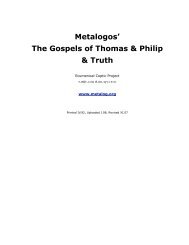Andrew Louth - Syriac Christian Church
Andrew Louth - Syriac Christian Church
Andrew Louth - Syriac Christian Church
You also want an ePaper? Increase the reach of your titles
YUMPU automatically turns print PDFs into web optimized ePapers that Google loves.
COSMIC THEOLOGY 63<br />
canvas much broader than the cosmos consisting of the earth and the<br />
heavens: the elaborate myths of the gnostics told of a pre-cosmic,<br />
heavenly drama, and the cosmos itself was, as often as not, an<br />
abortive consequence of a heavenly fall. The cosmos was bracketed<br />
between fall and redemption: it was essentially fallen, and<br />
Redemption was escape from it. The <strong>Christian</strong> doctrine of creation out<br />
of nothing was probably first formulated as part of the second-century<br />
reaction against gnosticism: 6 as well as upholding the sovereignty of<br />
the one God against the kind of fragmentation implicit in the gnostic<br />
system of aeons, it affirmed the essential goodness of the cosmos. It<br />
was in the good cosmos that God had made from nothing that the Fall<br />
had taken place, and Redemption, as we have sketched above,<br />
involved restoration of the cosmos.<br />
ORIGENIST COSMOLOGY<br />
But the idea of a cosmic fall, that is a fall from some other state<br />
resulting in the cosmos, was tenacious, and is one of the points in<br />
which the great third-century theologian Origen, who had himself<br />
argued against many of the tenets of gnosticism, found himself in<br />
fundamental agreement with the gnostics. For Origen, <strong>Christian</strong>ity is<br />
essentially a cosmic story. In the beginning all rational beings had<br />
been created equal, and through the Word of God had gazed in<br />
contemplation on the unique Godhead of the Father. The Fall was the<br />
result of a lessening of their attention, and a consequent turning away<br />
from contemplation of God (owing to satiety, Origen said: they had<br />
had enough). Their ardour cooled (Origen derived soul, psyche, from<br />
psychros, cold, or psychesthai, to cool) and they fell into a cosmos<br />
consisting of bodies. 7 The cosmos was created by God to arrest the fall<br />
of the rational beings, and was a carefully calibrated system, with<br />
bodies of varying degrees of density, so that the fate of the fallen souls<br />
exactly matched the extent of their turning away from God: those<br />
whose lack of attention had been momentary became angels, those<br />
whose turning from God was more settled became demons, and in<br />
between there were human beings.<br />
Such a cosmos was a demonstration of God’s providence and<br />
judgment: his providence provided this carefully structured cosmos<br />
and his judgment determined the exact position of each soul within it.<br />
Each soul would find that its position in the cosmos answered its need,<br />
so that the effort required to turn back to God was neither so<br />
demanding as to lead to despair nor so slight as to make barely any<br />
difference. Perhaps more than one cosmos (and thus more than one<br />
lifetime) would be needed, but God’s providence and judgment were<br />
not to be thwarted: finally all the rational beings would retain their




